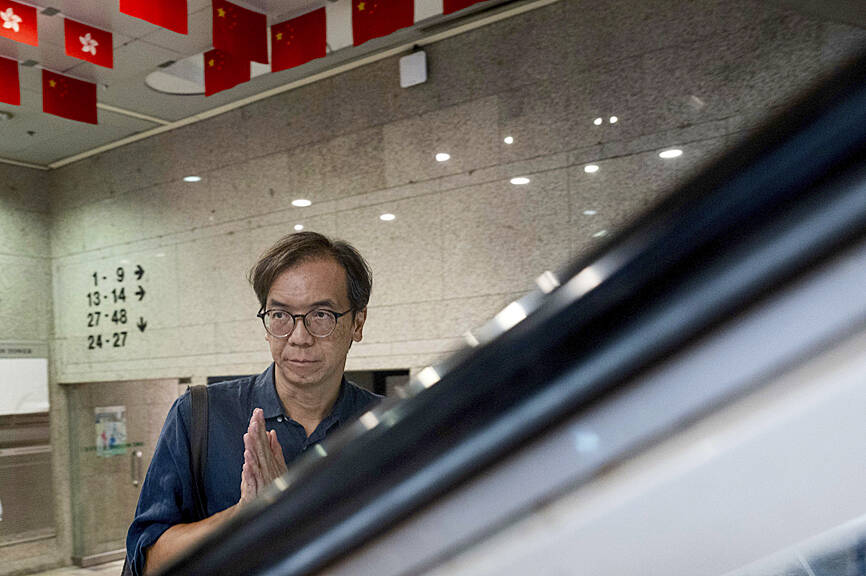Hannah Wong cried when the Hong Kong government effectively forced the territory’s Apple Daily and Stand News out of business three years ago. Among the last news firms in the territory willing to criticize the government openly, many saw their end as a sign that the old Hong Kong was gone for good.
Today, the 35-year-old makeup artist says she has gone from reading the news every day to reducing her intake drastically to protect herself from despair.
Four years into a crackdown on dissent that has swept up democracy-leaning journalists, rights advocates and politicians in the territory, a lot of people are tuning out the news. It is a striking sign of change in a place that used to pulse with talk, from morning conversations over newspapers in bustling dim sum restaurants, to lively debates on social media throughout the day, to evening discussions at dinner tables.

Photo: AP
Wong says it is too hard to read the headlines, but avoiding them left her feeling more disconnected.
“There’s a loss of the sense of belonging to this place,” she said.
Since Beijing imposed a national security law in 2020, press freedom has narrowed.
In 2021, Apple Daily and Stand News closed down after the arrests of their top management. Hong Kong was ranked 135 out of 180 territories in Reporters Without Borders’ latest World Press Freedom Index, down from 80 in 2021.
On Thursday, two former editors of Stand News were convicted in the first sedition case involving media since the former British colony returned to China’s rule in 1997. The judge said their company became a tool for smearing the Beijing and Hong Kong governments during protests in 2019.
After the verdict, the Hong Kong government said that when journalists base their reporting on facts, there are no restrictions on press freedom.
Politics is one factor driving news avoidance, said Francis Lee (李立?), a professor of journalism and communication at the Chinese University of Hong Kong.
Early last year, a survey conducted by Lee’s team at the Center for Communication and Public Opinion Survey found that about four in 10 Cantonese-speaking adults in Hong Kong agreed or strongly agreed that they sometimes want to avoid news about the changing social or political environment in Hong Kong.
People who do not trust the government are more likely to tune out the news, such as democracy supporters who tend to view the territory’s recent changes negatively, Lee said.
When people perceive the news firms as unable to perform, they are also more inclined to avoid news, he said.

Kehinde Sanni spends his days smoothing out dents and repainting scratched bumpers in a modest autobody shop in Lagos. He has never left Nigeria, yet he speaks glowingly of Burkina Faso military leader Ibrahim Traore. “Nigeria needs someone like Ibrahim Traore of Burkina Faso. He is doing well for his country,” Sanni said. His admiration is shaped by a steady stream of viral videos, memes and social media posts — many misleading or outright false — portraying Traore as a fearless reformer who defied Western powers and reclaimed his country’s dignity. The Burkinabe strongman swept into power following a coup in September 2022

‘FRAGMENTING’: British politics have for a long time been dominated by the Labor Party and the Tories, but polls suggest that Reform now poses a significant challenge Hard-right upstarts Reform UK snatched a parliamentary seat from British Prime Minister Keir Starmer’s Labor Party yesterday in local elections that dealt a blow to the UK’s two establishment parties. Reform, led by anti-immigrant firebrand Nigel Farage, won the by-election in Runcorn and Helsby in northwest England by just six votes, as it picked up gains in other localities, including one mayoralty. The group’s strong showing continues momentum it built up at last year’s general election and appears to confirm a trend that the UK is entering an era of multi-party politics. “For the movement, for the party it’s a very, very big

ENTERTAINMENT: Rio officials have a history of organizing massive concerts on Copacabana Beach, with Madonna’s show drawing about 1.6 million fans last year Lady Gaga on Saturday night gave a free concert in front of 2 million fans who poured onto Copacabana Beach in Rio de Janeiro for the biggest show of her career. “Tonight, we’re making history... Thank you for making history with me,” Lady Gaga told a screaming crowd. The Mother Monster, as she is known, started the show at about 10:10pm local time with her 2011 song Bloody Mary. Cries of joy rose from the tightly packed fans who sang and danced shoulder-to-shoulder on the vast stretch of sand. Concert organizers said 2.1 million people attended the show. Lady Gaga

SUPPORT: The Australian prime minister promised to back Kyiv against Russia’s invasion, saying: ‘That’s my government’s position. It was yesterday. It still is’ Left-leaning Australian Prime Minister Anthony Albanese yesterday basked in his landslide election win, promising a “disciplined, orderly” government to confront cost-of-living pain and tariff turmoil. People clapped as the 62-year-old and his fiancee, Jodie Haydon, who visited his old inner Sydney haunt, Cafe Italia, surrounded by a crowd of jostling photographers and journalists. Albanese’s Labor Party is on course to win at least 83 seats in the 150-member parliament, partial results showed. Opposition leader Peter Dutton’s conservative Liberal-National coalition had just 38 seats, and other parties 12. Another 17 seats were still in doubt. “We will be a disciplined, orderly